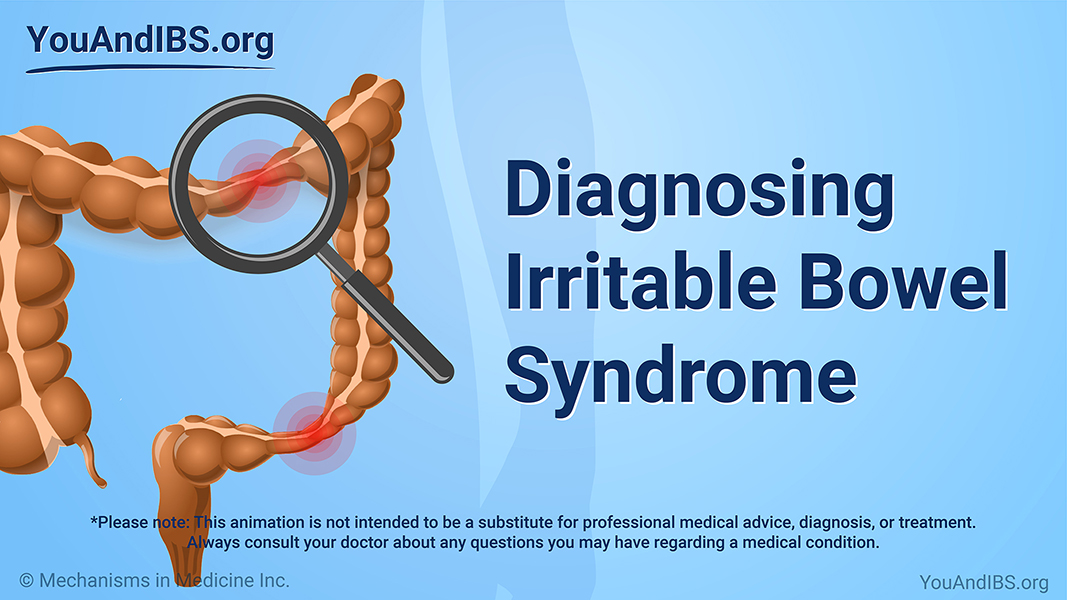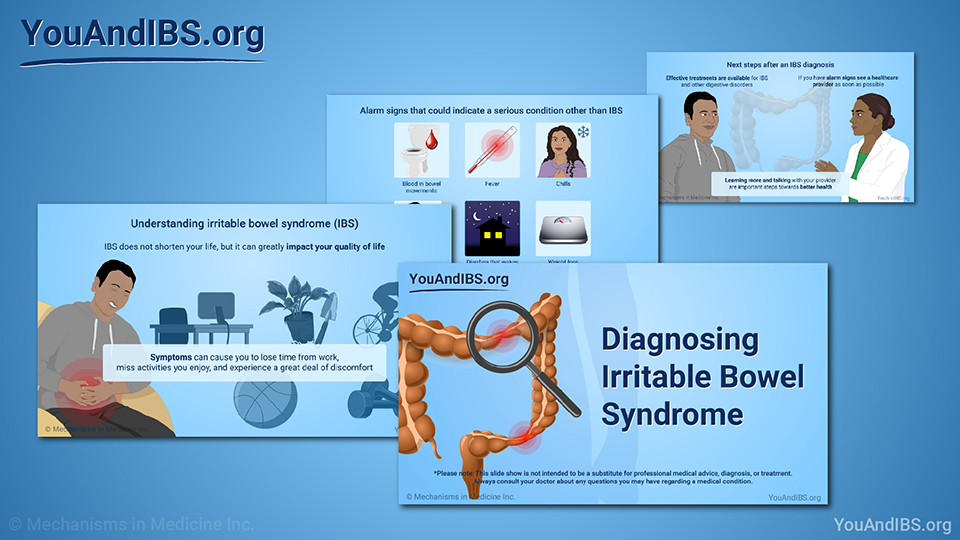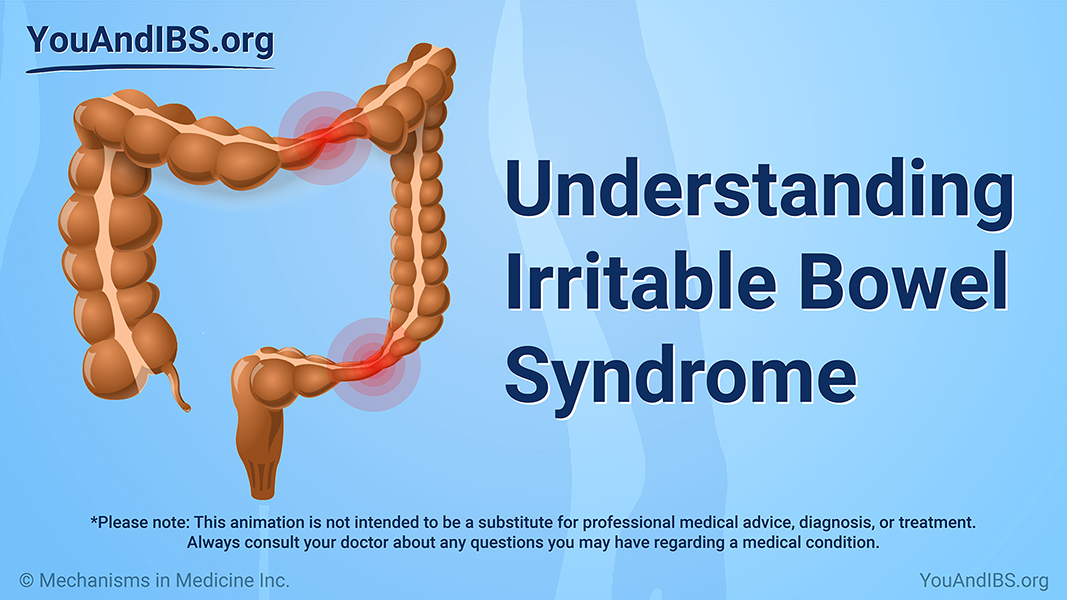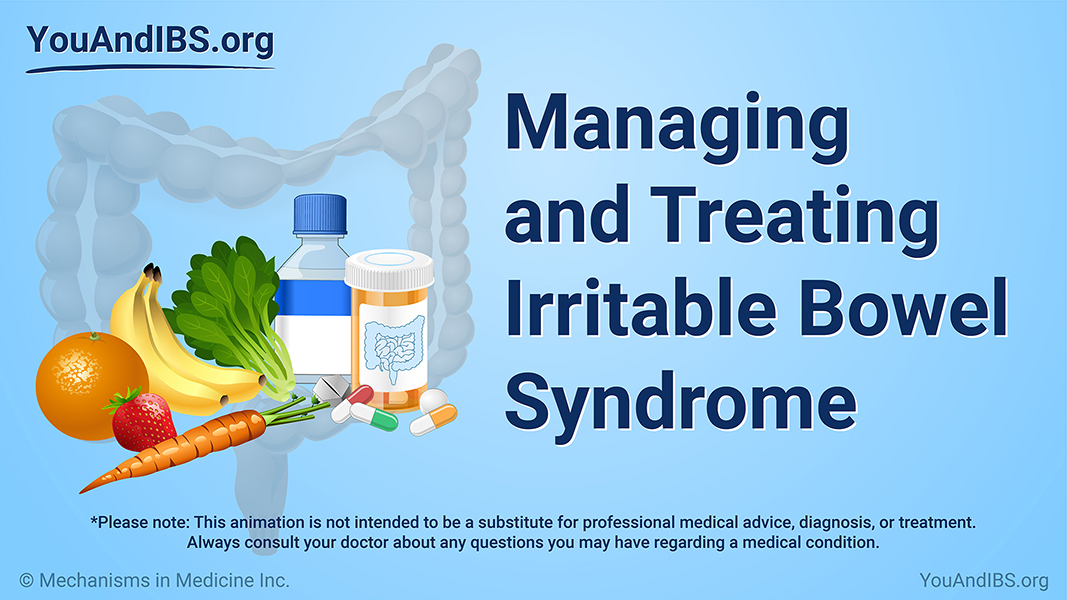Diagnosing Irritable Bowel Syndrome
*Please note: This slide show is not intended to be a substitute for professional medical advice, diagnosis, or treatment. Always consult your doctor about any questions you may have regarding a medical condition.
Understanding irritable bowel syndrome (IBS)
Irritable bowel syndrome, or IBS, is a condition that causes abdominal pain and discomfort associated with changes in your bowel habits. Five to 10 percent of people worldwide have IBS.1
Understanding irritable bowel syndrome (IBS)
IBS does not shorten your life, but it can greatly impact your quality of life. Symptoms can cause you to lose time from work, miss activities you enjoy, and experience a great deal of discomfort.1
How is IBS diagnosed?
IBS is normally diagnosed after a full discussion with your healthcare provider about your symptoms, your health history, and a physical examination.
Your healthcare provider will also check for signs of a more serious condition. You might need some basic tests to make sure another disorder is not causing your symptoms.1
Preparing for an IBS evaluation
You can prepare for seeing your healthcare provider by learning about IBS and making a list of questions to ask.
Write down your:
- Symptoms, when they began, and triggers that make them better or worse
- Evaluations you have had done (labs, scans, and endoscopies)
- Treatments tried, and
- Questions2
You may bring a family member or friend to help remember questions and keep track of answers.
Alarm signs that could indicate a serious condition other than IBS
Some symptoms, called alarm signs, could indicate a serious condition other than IBS.
These include:3,4
- blood in bowel movements
- fever
- chills
- night sweats
- diarrhea that wakes you from sleep
- weight loss
More alarm signs that could indicate a serious condition other than IBS
Your healthcare provider may notice alarm signs, including: 3,4
- A low number of red blood cells, called anemia
- A lump or mass that can be felt
- Symptoms starting when you are over 50
If you have alarm signs, your healthcare provider may recommend additional testing to rule out other conditions.
Should you see an IBS specialist?
Many people get symptom relief after working with their primary care providers. If you don't, or you have other symptoms that do not fit the diagnosis of IBS, you may be referred to a gastroenterologist who specializes in digestive disorders such as IBS.5
Why is IBS difficult to diagnose?
IBS symptoms can look like those of other digestive disorders. You may also have different symptoms at different times.
Not all healthcare providers may be familiar with or comfortable diagnosing IBS, which can delay diagnosis. This is one reason it may help to see a healthcare provider who is experienced in treating IBS.
What tests do I need for IBS?
You may not need many tests at first. If you do, the tests will likely depend on the type of IBS you have.4
Tests if you have IBS-D
If you mainly have diarrhea (IBS-D), you may be screened for celiac disease, low blood count, inflammation in the blood or stool, and infection.6
Tests if you have IBS-D
You may also have a breath test to learn if you are intolerant to certain carbohydrates or to check for too much of certain bacteria in your digestive system.
Tests if you have IBS-C
If you mainly have constipation, or IBS-C, you may have tests to measure muscle reflexes and pressure changes during bowel movements.
You may also have a GI transit study or gastric emptying study to learn how quickly things pass through your digestive system.6
Tests if you have mixed IBS
You may have blood tests if you have both diarrhea and constipation.6
Tests to find other digestive disorders
If you have weight loss, rectal bleeding, or abnormal lab test results, your healthcare provider may recommend an upper endoscopy or colonoscopy.
These tests allow themto see inside the digestive system for inflammation or cancer. This is because IBS can have similar symptoms to other digestive system disorders, including celiac disease, Crohn's disease, and colitis.6
Learn more about IBS diagnosis
It's important to remember that IBS can often be diagnosed without extensive testing. Tell your healthcare provider about all your symptoms, even if they seem embarrassing.
You can learn more about how IBS is diagnosed from the International Foundation for Gastrointestinal Disorders.
Next steps after an IBS diagnosis
Effective treatments are available for IBS and other digestive disorders. If you have alarm signs, it is important to see a healthcare provider as soon as possible. Learning more and talking with your provider are important steps towards better health.
References
- International Foundation for Gastrointestinal Disorders. Irritable bowel syndrome. Available at https://iffgd.org/gi-disorders/irritable-bowel-syndrome/. Accessed March 21, 2023
- Brandt LJ, Chey WD, Foxx-Orenstein AE, et al, for the American College of Gastroenterology Task Force on Irritable Bowel Syndrome. An evidence-based position statement on the management of irritable bowel syndrome. Am J Gastroenterol. 2009 Jan. 104 suppl 1:S1-35.
- International Foundation for Gastrointestinal Disorders. Working with your healthcare provider. Available at: https://aboutibs.org/living-with-ibs/your-healthcare-team/. Accessed March 21, 2023.
- International Foundation for Gastrointestinal Disorders. Changes you should not ignore if you have IBS. Available at https://aboutibs.org/signs-and-symptoms/changes-you-should-not-ignore-if-you-have-ibs-2/. Accessed March 21, 2023.
- Neshatian L, Moosavi S. Current approach to the diagnosis of irritable bowel syndrome. 2022. International Foundation for Functional Gastrointestinal Disorders. Available at https://iffgd.org/resources/publication-library/current-approach-to-the-diagnosis-of-ibs/. Accessed March 21, 2023.
- International Foundation for Gastrointestinal Disorders. FAQs about IBS. Available at https://aboutibs.org/what-is-ibs/faq-about-ibs/. Accessed March 21, 2023.
- International Foundation for Gastrointestinal Disorders. Testing in IBS. Available at https://aboutibs.org/what-is-ibs/diagnosis-of-ibs/testing-in-ibs/. Accessed March 21, 2023.
This slide show explains the tests that healthcare providers use to
diagnose irritable bowel syndrome (
IBS), how to prepare for an
IBS evaluation with your healthcare provider, and
alarm signs that could indicate a serious condition other than IBS. It's important to remember that IBS can often be diagnosed without extensive testing. Tell your healthcare provider about all your symptoms, even if they seem embarrassing. If you have alarm signs, seeing a healthcare provider as soon as possible is important. Learning more and talking with your provider are important steps toward better health.
-
Share with family and friends:
Click here to take our SURVEY
Your feedback is important to us! We will use your feedback to develop future areas of content about IBS which will help other patients, caregivers and families.














